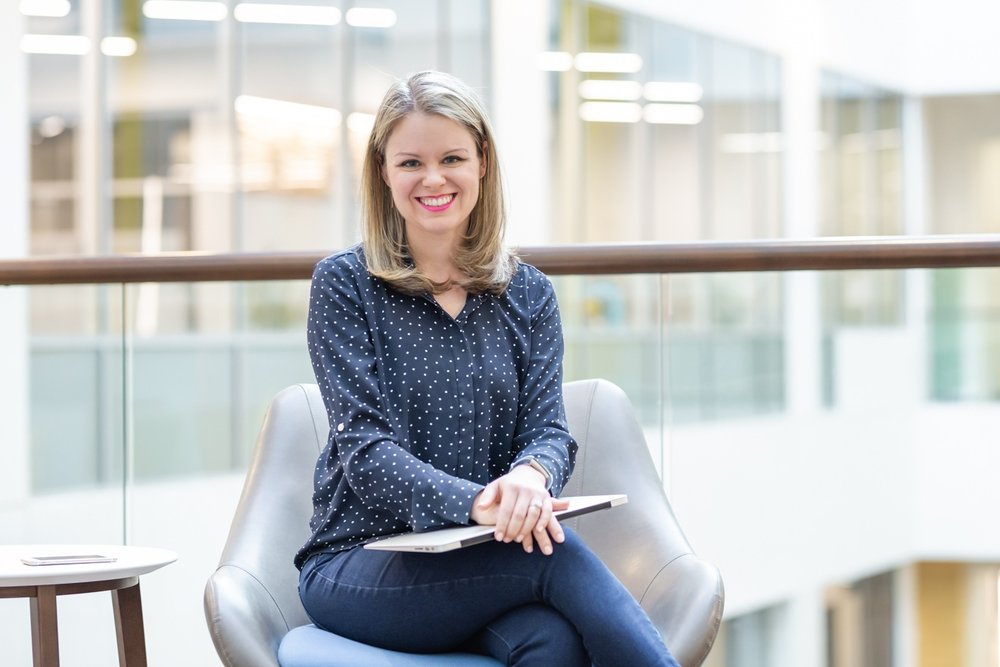
Katie D. McMillan has had an interest in maternal and child health since her university days, when she was pursuing a degree in public health and at the same time started to learn more about technology’s ability to improve both public and individual health. Unsurprisingly years later, after doing a lot of work in healthtech development, FemTech sparked her interest. Today she works at the intersection of research and entrepreneurship with a mission to create awareness for innovation in women’s health.
During our interview Katie shares some insights into her work as a femtech advocate, her personal experience with femtech products and discusses, why she thinks more focus on chronic illness is needed.
Hi Katie! I am so excited for this interview and to learn more about the many different projects in the femtech space you’re involved with! Could you tell me more about your work? What’s your background? And when did you develop an interest in the femtech space?
KDM: I started my career after college working on large-multinational global health projects which sparked my interest in both women’s health and mHealth (mobile health) when I was traveling around the world. After a few years I decided to pursue my master’s in public health (MPH) with a focus on maternal and child health. Over the course of those two years in graduate school I continued to develop a parallel interest in digital health technologies, entrepreneurship, and the opportunity for technology to improve both larger public health aims as well as individual health. I’ve spent the last 6 years in health tech product development, advising researchers, and health system operalization of connected health initiatives across practical every clinical discipline.
In the fall of 2018 I started to hear about FemTech and the exploding industry that marries both of my professional loves: technology and women’s health. I started researching every company I could find, connecting with founders and thought leaders, and starting my own #FemTechFriday initiative on social media to make women aware of FemTech products.
You’re a lecturer at Duke and also involved with the university’s Mobile App Gateway. Can you tell us more about this program?
KDM: The Mobile App Gateway is the digital health hub for Duke University Health System, which includes all of our clinical staff (like doctors and nurses) as well as researchers and students in the Duke School of Medicine. We support innovators via our consulting model. We meet one on one with teams that would like to leverage technology to address some health issue – often something they see in their patients. This means a variety of things from conducting market research on existing products, to writing grant or funding applications, to scoping and reviewing software development contracts, and planning product launches or research recruitment strategies. We also provide monthly workshops or lectures for our community which highlights work around Duke as well as builds skills in areas like design thinking and user experience research.
So you do a lot of research in the femtech space. What are the “femtech facts” that usually surprise people? Overall, do you think there is enough awareness for innovation in women’s health?
KDM: I presented my first round of research which was a review of over 150 companies back in March 2019. Overall I found that the audience was surprised at how quickly the market is growing, the wide variety of niches within women’s health (from fertility to menopause!), as well as how consumer-marketed products could be used hand-in-hand with clinical treatment of women. For example, ovulation tracking tools can improve timing of fertility treatments.
I initially found you via your Instagram account @wellmadehealth and your #FemtechFriday initiative, which you mentioned earlier. What are some of your favorite products, that have been featured so far? Which product are you most excited to try yourself?
KDM: FemTechFriday is my favorite! While I see some companies like Ava Women advertising on Pinterest and using social media influencers I think there is still a gap in what’s available to women and what women know about. That’s where #FemTechFriday comes in – to close that educational gap and provide unbiased information about FemTech products and services. Having gone through trying to conceive, a pregnancy, and soon a birth in the next few weeks I’ve had the opportunity to try things first hand. I’ve been enjoying the Bloomlife contraction tracker and look forward to seeing how that product progresses to better detect labor. And I just purchased an Elvie breast pump. Their design is such a departure from the Medela breast pump I had with my last baby that was a pain to lug, clean, and use that I can’t wait to use something more discrete and well-designed.
In a recent interview with Bustle, you talk about, how you want more femtech companies to innovate for women with chronic diseases that disproportionately affect women instead of only focusing on reproductive health. Are there any companies or products in the space today, that are worth mentioning? And why do you think most products today are focused on the reproductive cycle?
KDM: I could talk for hours about why the focus on reproduction since it is a fairly complex question, but if I was to distill it down to a few points — the ability to conceive children is one of the major biological differences between men and women, and because of the potential to get pregnant for about 30 years of our lives it’s an area that requires active management by women which spans preventing pregnancy, trying to get pregnant, pregnancy, postpartum, breastfeeding, and menopause. But we can’t sum up all of our medical needs as women to our lady parts! There’s mental health, migraines, cancer prevention/diagnostics/and treatment, heart disease, diet and nutrition, and more!



